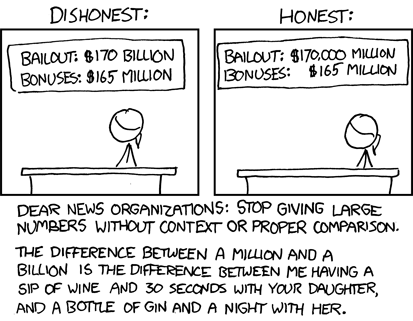Wednesday, March 04, 2009
How Big Is A Trillion?
I have to admit, I'm getting a bit tired of hearing our elected representatives discuss our national budget, and the multiple bailout plans -- how many of them are there by now? -- and stimulus packages, using the term "trillion" casually.
That's one heck of a big number: 1,000,000,000,000. It's the number of seconds in 31,688 years; go back that far and you'd see Cro-Magnon Senators and Neanderthal Congressmen debating about how many Woolly Mammoth skins are in next year's budget. It's the number of millimeters in one million kilometers; that's enough millimeters to wrap around the globe 25 times.
I found myself wondering: how big is a stack of one trillion dollar bills? Well, the size of American paper currency is 2.61 inches wide and 6.14 inches long; bills are .0043 inches thick and weigh 1 gram.
Therefore, if you wanted to stack up one trillion dollar bills into a cube-shape, that cube would be roughly 4100 inches on a side, or 341.6471 feet, or 104.14 meters. (And that cube would weigh one million metric tons.)
I was thinking about this in terms of the growing popularity of Tea Party demonstrations, and a comment I saw at neo-neocon's site, in re dumping Monopoly money in protest. So, I wondered, how big is a trillion dollars in Monopoly money?
Well, the size of one bill of Monopoly money is 4" by 2.25". I don't know how thick the paper is, but let's assume 16-lb. paper, which is 0.0032 inches thick. Similar algebra leads us to a solid cube of Monopoly one-dollar bills, 255.4365 feet on a side; that's 3065.24 inches, or 77.86 meters.
Unfortunately, getting that much Monopoly money together in one place would be daunting. Each Monopoly set has 40 singles. Even if we used all the Monopoly money we have ($15,140 per set), we'd need to raid over 66 million sets to get enough.
On the other hand, Monopoly money has an advantage over the real thing: it's not illegal to print your own...
UPDATE: Obviously, I'm not the only one to explore this idea.
UPDATE II: The delightfully geeky xkcd.com has a different perspective on this:










